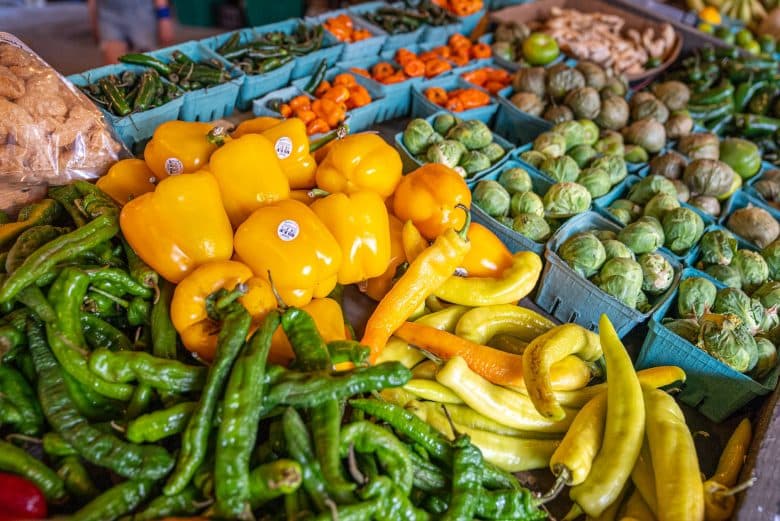Running a successful wholesale produce business requires careful planning, organization, and attention to detail. The wholesale produce business can be a lucrative venture since there is a constant demand for fresh fruits and vegetables from consumers, restaurants, and grocery stores.
Additionally, the markup on produce items is often high, allowing for significant profit margins. This guide will cover everything you need to know about running an effective wholesale produce business, including sourcing products, building relationships with buyers, and managing inventory.
Buying produce with Silo allows for more informed purchasing. You’ll benefit from unparalleled visibility and market insights for more profitable outcomes.
Nevertheless, here are some tips that will set you up for success in the competitive world of wholesale produce.
What is wholesale produce?
Wholesale produce is fresh produce sold to a business or retailer rather than directly to consumers. This transaction often involves larger quantities and lower prices, as the purchasing business will resell the produce to its customers.
In some cases, businesses may purchase from multiple wholesalers to have a diverse selection for their customers. The market for wholesale produce plays an important role in the food industry, as it provides businesses with the necessary ingredients and products for their offerings.
It also helps support local growers by providing them with an outlet to sell their goods on a larger scale. The wholesale produce market helps bring fresh, high-quality foods to consumers through various channels.
4 benefits of selling wholesale
1. Allows access to multiple markets
One of the major benefits of selling wholesale is the ability to access multiple markets. By partnering with wholesalers, retailers can reach a larger consumer base and expand their customer demographics. This not only increases sales potential but also strengthens brand recognition.
Additionally, wholesalers often have established relationships with multiple retail outlets, making it easier for brands to break into new markets and broaden their reach. Overall, selling wholesale allows for greater market access and can ultimately lead to significant business growth opportunities.
2. Gives you the ability to efficiently sell in bulk
Selling in bulk or wholesaling can have many advantages for your business. It allows you to sell more produce at once, increasing profits. Additionally, wholesaling often means establishing long-term partnerships with buyers, providing a steady sales flow.
Wholesale also allows for more efficient distribution and storage of products. You can ship a larger quantity to one buyer instead of individually packaging and sending smaller quantities to multiple customers. This can also lead to cost savings for both you and the buyer.
Overall, selling in bulk can bring numerous benefits to your business and should be considered as an option when looking to expand and increase profitability.
3. Saves time
One major benefit of selling wholesale is that it saves the buyer and seller time. Instead of having to sell products to multiple customers individually, a wholesaler can sell larger quantities to one buyer, who then distributes the products. This streamlines the sales process and frees up time for both parties to focus on other tasks.
Additionally, selling in bulk often results in higher profits for the seller. Wholesale prices tend to be lower than retail prices, but overall profit margins can be higher because larger quantities are being sold at once.
Wholesale also allows greater flexibility in customizing deals and negotiating pricing with buyers. Overall, selling wholesale can lead to increased efficiency and profitability for businesses.
4. Reduces resources used
Another benefit of selling wholesale is that it allows businesses to minimize the amount of resources used. By selling in bulk quantities, companies can cut down on packaging materials and reduce shipping costs. Wholesalers can also negotiate better prices with suppliers due to their larger orders, leading to cost savings.
In addition to resource conservation, selling wholesale can also increase business profitability. Wholesale customers tend to place larger orders and consistently demand products, resulting in a steady income stream. This can lead to long-term customer relationships and increased brand loyalty.
Overall, selling wholesale offers numerous advantages for the business and the environment. It minimizes resources used and increases profitability, ultimately leading to a more sustainable and successful business.
Places to buy wholesale produce
Wholesale directories
Wholesale directories can be valuable for buyers looking to purchase wholesale produce. These directories typically list suppliers and their product offerings, allowing buyers to compare and choose the best options for their business needs.
It’s important to note that while these directories can help find potential suppliers, buyers should always conduct thorough research and do their due diligence before making any purchasing decisions.
Additionally, some directories may charge a fee for access to their listings. However, the time and effort saved by utilizing a reputable directory can often outweigh the cost. Ultimately, wholesale directories can be a valuable tool in the search for reliable wholesale produce suppliers.
Wholesale marketplaces
In addition to directories, there are also online marketplaces that offer wholesale produce. These marketplaces connect buyers and sellers, allowing them to negotiate prices and terms directly with each other.
Wholesale marketplaces can be a good option for businesses that know exactly what they’re looking for and are comfortable negotiating prices. However, it’s important to remember that not all sellers on these marketplaces are reputable or trustworthy. As such, buyers should always exercise caution and due diligence when dealing with new suppliers.
Wholesale clubs
Another option for businesses looking to purchase wholesale produce is to join a wholesale club. These clubs typically require membership fees, but in return, offer access to bulk discounts and other benefits.
Wholesale clubs can be a good option for businesses that purchase large quantities of produce on a regular basis. However, it’s important to compare the costs of membership and calculate the potential savings before making a decision.
Wrapping up
Overall, selling wholesale offers many advantages. There are several different ways to find wholesale suppliers, including directories, marketplaces, and clubs. When choosing a supplier, it’s important to exercise caution and due diligence to ensure you are getting the best possible deal.














Leave a Reply